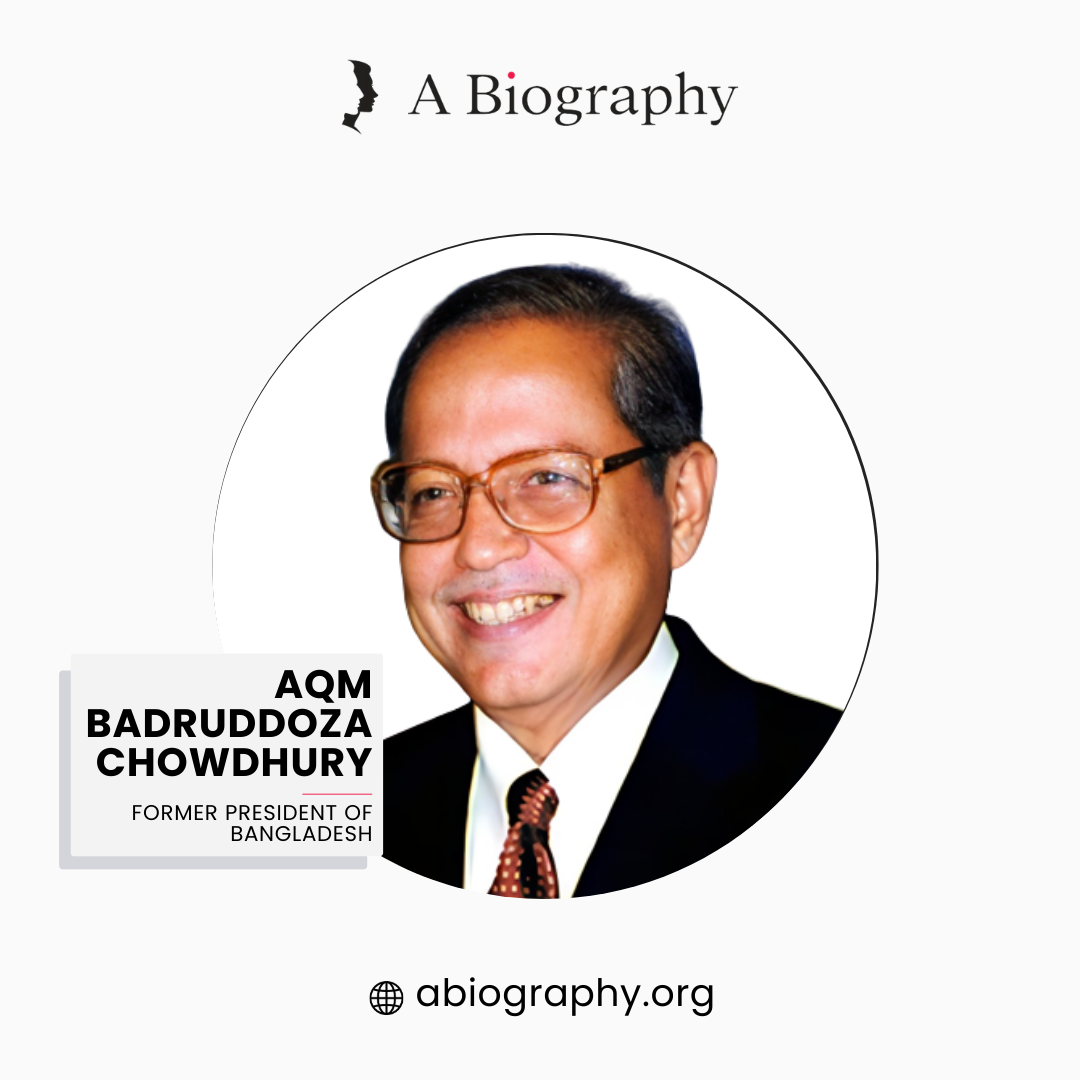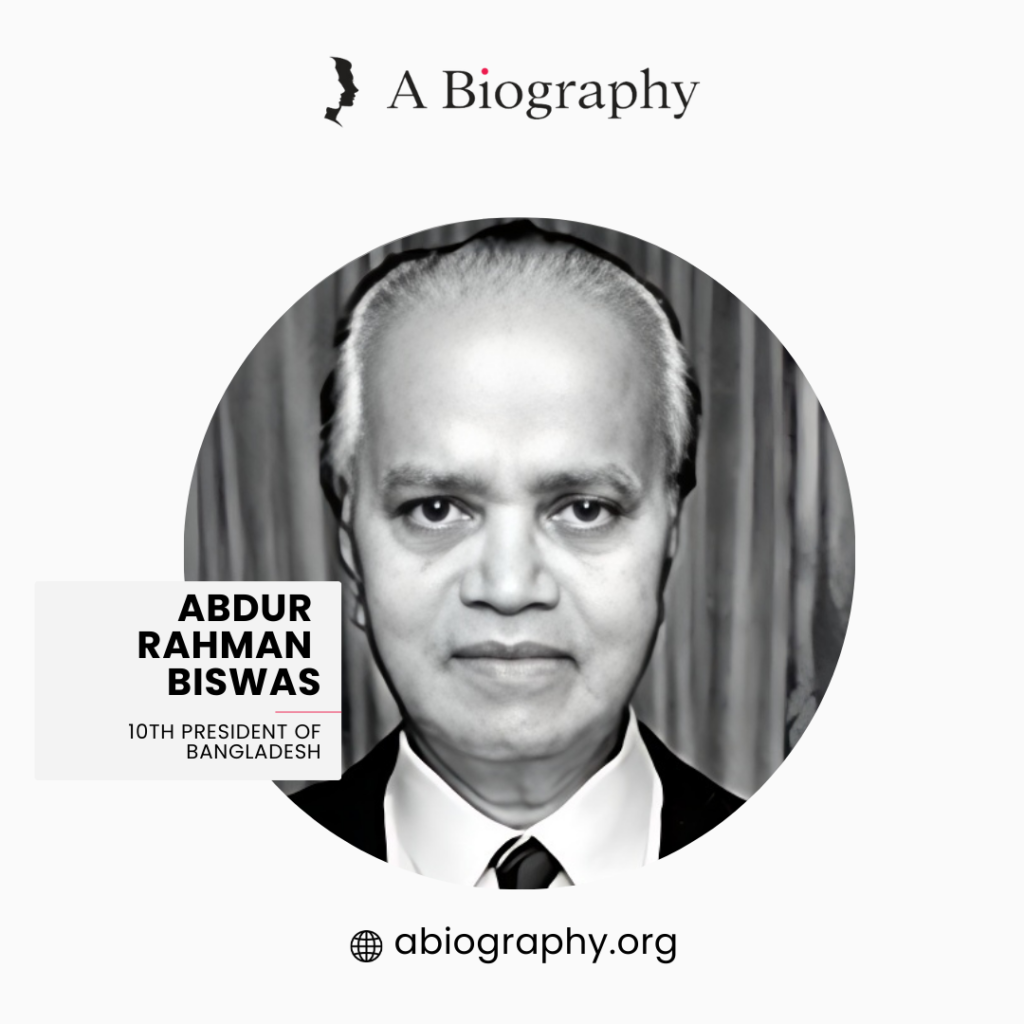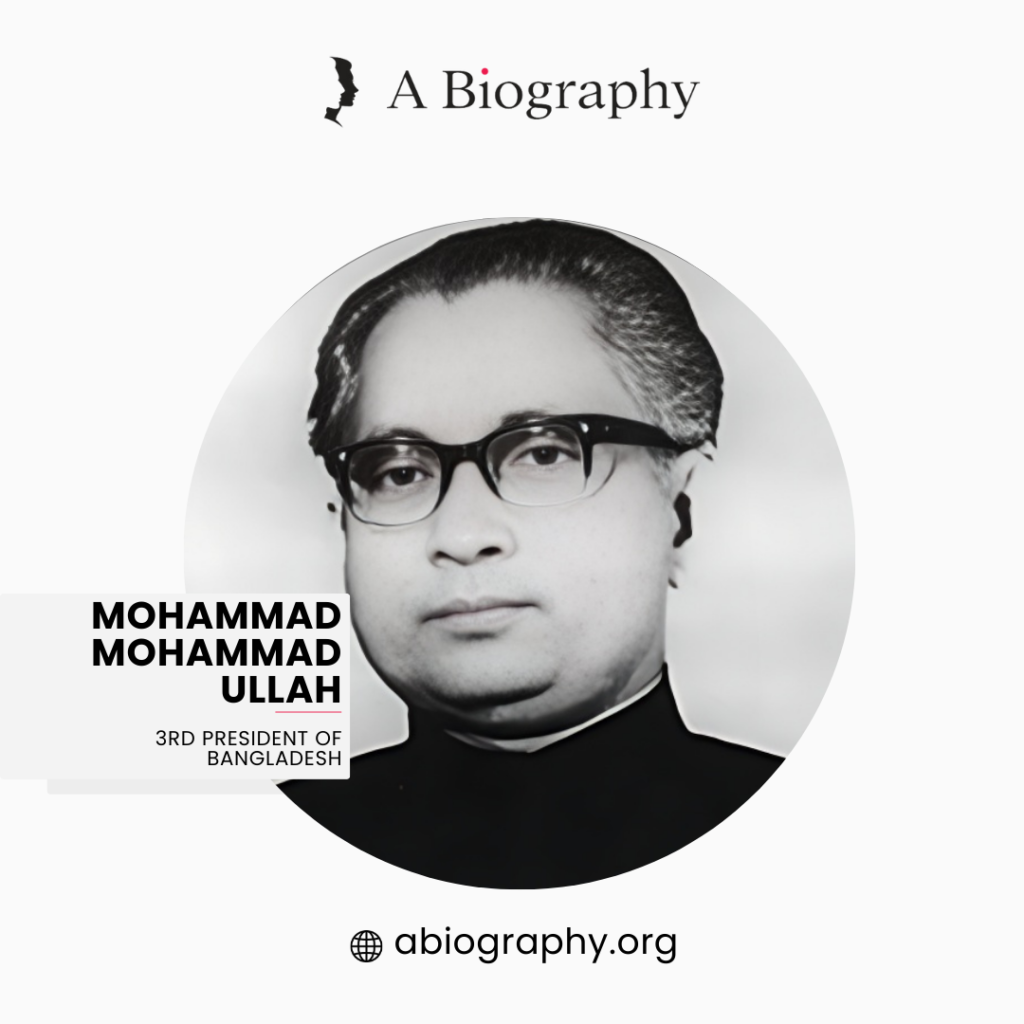BIOGRAPHY OF AQM BADRUDDOZA CHOWDHURY
PRESIDENT OF BANGLADESH
NOVEMBER 1, 1932 – PRESENT
Table of Contents
ToggleIntroduction
AQM Badruddoza Chowdhury, also known as Abdul Qasim Mohammad Badruddoza Chowdhury, is a prominent figure in the political history of Bangladesh. He served as the 13th President of Bangladesh from 2001 to 2002 and made significant contributions to the country’s development.
Chowdhury was a controversial figure. He was accused of corruption and nepotism. However, he was also a popular figure among many Bangladeshis. Chowdhury was a member of the Bangladesh Nationalist Party (BNP), and the Liberal Democratic Party (LDP). He is now the president of the political party Bikalpa Dhara Bangladesh.
He was known for his liberal views and for his ability to connect with people. Chowdhury’s noteworthy leadership and commitment to democratic values have left a long-lasting impact on the nation. In this article, we will elaborately discuss the biography of this popular political figure in Bangladesh.
Life of “AQM Badruddoza Chowdhury” at a Glance
◉ Real Name: Abdul Qasim Mohammad Badruddoza Chowdhury
◉ Known For: 13th President of Bangladesh (14 November 2001 until 21 June 2002)
◉ Preceded by: Shahabuddin Ahmed
◉ Succeeded by: Muhammad Jamiruddin Sircar (acting)
◉ Date of Birth: November 1, 1932
◉ Birthplace: Comilla, Bengal Presidency, British India
◉ Nationality: Bangladeshi
◉ Father Name: Kafiluddin Chowdhury
◉ Mother Name: Mrs. Sufia Khatun
◉ Education:
➣ SSC: St Gregory’s High School & College in 1947
➣ HSC: Dhaka College in 1949
➣ Bachelor of Medicine and Bachelor of Surgery (MBBS): Dhaka Medical College in 1954-1955
➣ TDD: Wales University in 1959
➣ MRCP: Royal College of Physicians of Edinburgh in 1961
➣ MRCP: Royal College of Physicians and Surgeons of Glasgow in 1961
◉ Profession:
➣ Worked as Rajshahi Medical College’s Associate Professor of Medicine in 1964
➣ Served as the associate Professor of Medicine at Sir Salimullah Medical College during 1964–1970
➣ Became Sylhet Medical College’s Professor of Medicine in 1970
➣ Held the position of National Anti-Tuberculosis Association of Bangladesh’s (NATAB) President multiple times
➣ Became President of the Asia Pacific Zone of the International Union Against Tuberculosis of Lung Diseases (IUATLD)
➣ Became BNP’s first secretary-general
➣ From the constituency of Munshiganj, he was elected as a member of the parliament in 1979
➣ Worked as the cabinet minister of the Health and Population Ministry between 1979 and 1982
➣ Appointed as the minister of the Education and Cultural Affairs ministry in 1991
➣ Elected as the Deputy Leader of the Parliament’s House from 1978 to 1982 and again from 1991 to 1996
➣ Served as the Opposition Parliamentary Party’s Deputy Leader from 1996 to 2001
➣ Selected as the foreign minister of Bangladesh in October 2001
➣ Founded Bikalpa Dhara Bangladesh in March 2004 and the president of the party till now excluding for a short period from December 2008 to April 2009
➣ Was a member of the Liberal Democratic Party (LDP)
◉ Religion: Islam
◉ Native Language: Bangla
◉ Married to: Hasina Warda Chowdhury
◉ Children: One son and two daughters
➣ Mahi Badruddoza Chowdhury
➣ Muna Chowdhury
➣ Shaila Sharmin Chowdhury
◉ Awards Received:
➣ Bangladesh Television Award (1976)
➣ Independence Medal (1993)
Early Life and Education
Chowdhury was born at the home of his maternal grandfather in Comilla, Bengal Presidency, British India, on November 1, 1932. His paternal ancestors hailed from Majidpur Dayhata, Srinagar, Bikrampur, which is now known as Munshiganj District. He is the second son of the late Kafiluddin Chowdhury and Mrs. Sufia Khatun. By the way, his father, Kafiluddin Chowdhury, was quite a prominent political leader of the Awami League back in the day
He even served as the general secretary of the United Front and worked as a Minister in the provincial cabinet of the United Front of what was then East Pakistan. Now, let us tell you about Chowdhury’s educational journey. In 1947, he achieved his secondary school certificate from St Gregory’s High School & College. Then, in 1949, he completed his higher secondary education at Dhaka College.
In 1954-1955, he achieved a Bachelor of Medicine and Bachelor of Surgery (MBBS) degree from Dhaka Medical College. He went on to pursue post-graduate medical education at prestigious institutions like the Brompton Chest Institute in London, and the Post Graduate Medical School at Hammersmith, also in London.
Chowdhury was an absolute genius when it came to his studies. He aced his MBBS examination, securing the first position. He earned the MRCP degree from the Royal College of Physicians of Edinburgh and from the Royal College of Physicians and Surgeons of Glasgow, both in 1961. In 1959, he obtained a TDD degree from Wales University.
He became an Honorary Fellow of FCPS in Bangladesh in 1978. Chowdhury also became a Fellow of the Royal College of Physicians of Edinburgh (FRCPE) and a Fellow of the Royal College of Physicians and Surgeons of Glasgow (FRCPG).
Medical Career
Chowdhury began his professional career in the medical field and started working as Rajshahi Medical College’s Associate Professor of the Medicine department in 1964. During 1964–1970, he was also the Associate Professor of Medicine at Sir Salimullah Medical College.
Later, in 1970, he became Sylhet Medical College’s Professor of Medicine. People considered him one of the best doctors of medicine in the country at that time. He held the position of National Anti-Tuberculosis Association of Bangladesh’s (NATAB) President multiple times.
Chowdhury also had the honor of being the President of the Asia Pacific Zone of the International Union Against Tuberculosis of Lung Diseases (IUATLD), which has its headquarters in Paris. He has contributed to various national and international medical journals with his published medical papers.
Political Career
Chowdhury was really motivated by Lieutenant General Ziaur Rahman, the founding chairman of the Bangladesh Nationalist Party (BNP). He started his political career as the BNP’s secretary general when it was just starting out. In fact, he was the BNP’s first secretary-general. In the 1979’s parliamentary election, Chowdhury was a nominee for BNP from Munshiganj and he won that election.
He worked as the cabinet minister of the Health and Population Ministry between 1979 and 1982. When the BNP won the parliamentary elections again in 1991, he was appointed as the minister of the Education and Cultural Affairs ministry. At that time, he was the most senior Minister in the cabinet of Begum Khaleda Zia.
Chowdhury was five times elected as a Member of Parliament from Munshiganj-1, his home constituency. He was the Deputy Leader of Parliament’s House from 1978 to 1982 and again from 1991 to 1996. He also served as the Opposition Parliamentary Party’s Deputy Leader from 1996 to 2001. In both positions, Chowdhury played an effective part.
In October 2001, when the BNP party again came to power, he was selected as the foreign minister of the country. He was chosen by the members of the parliament to serve as Bangladesh’s 13th president in November 2001. On November 14th, 2001, Chowdhury took the presidential oath of office. However, his time as President didn’t last very long.
Things got a little messy when, after seven months, Chowdhury decided not to go to the grave of the founder of the BNP, Ziaur Rahman, on the occasion of his death anniversary. This decision didn’t sit well with the party members, who blamed him for divulging the party. As tensions rose, he met with BNP President Begum Khaleda Zia on 21st June 2002, at her residence.
Sensing the escalating situation, Chowdhury decided to resign from the presidency before things got even messier. And not just that, he resigned from the BNP as well. Chowdhury believed that Bangladesh needed a third party in its existing two political parties’ democracy.
He strongly felt the urge to recruit civil society members into politics to combat terrorism and corruption and to create good governance in Bangladesh through an alternative political party. Following this vision, another BNP member of parliament Mohammad Abdul Mannan, and Mahi Badruddoza Chowdhury, his son resigned from the Jatiya Sangsad.
March 2004 marked a turning point when they founded Bikalpa Dhara Bangladesh, a new political party, with Chowdhury taking on the role of party President and Mohammad Abdul Mannan becoming the Secretary-General. This party became a strong criticizer of the government at the time, and its maximum members were former members of the ruling BNP who had left the party.
Their efforts paid off when the party won the seat of the Munshiganj-1 constituency in the 2004 by-election, with Mahi Badruddoza Chowdhury being elected as a member of parliament. Later on, in the 2018 general elections, the party joined the grand alliance and secured two seats under them. Interestingly, Chowdhury also joined forces with senior statesman Dr. Colonel (Retd) Oli Ahmed for a short period.
They founded the Liberal Democratic Party (LDP) of Bangladesh along with a number of prominent retired ministers from the cabinet of BNP. However, their collaboration didn’t last long, and Chowdhury chose to step away from LDP and focus his efforts on revitalizing Bikalpa Dhara Bangladesh.
Since its inception, Chowdhury has been the president of the Bikalpa Dhara Bangladesh, excluding for a short period from December 2008 to April 2009 when he resigned after the party failed to win any seats in the parliamentary elections of 2008.
Personal Life
The wife of Chowdhury is Hasina Warda Chowdhury. Together, they nurtured a loving family and provided a solid foundation for their children. They have one son and two daughters. Their son Mahi Badruddoza Chowdhury is a political leader like his father. The occupation of one of their daughter named Muna Chowdhury is Barrister in Law.
Their other daughter’s name is Shaila Sharmin Chowdhury and she is a doctor. Chowdhury lives in the Baridhara area, which is a neighborhood in Dhaka. Despite his demanding political career, Chowdhury tried to spend quality time with his loved ones and maintained a strong bond with his family. Beyond his political and familial commitments, Chowdhury had a range of hobbies and interests.
He was a distinguished orator, dramatist, author, television host, and essayist. Being a former cultural activist, he had a profound love for art and culture, supporting and promoting various artistic endeavors throughout his life. However, like any prominent figure in public life, AQM Badruddoza Chowdhury faced his share of controversies.
His decision to resign from the presidency, citing differences with the then-ruling party, sparked heated debates and discussions. Nonetheless, his integrity and commitment to democratic values remained unblemished, making him a respected figure in the eyes of many.
Legacy
AQM Badruddoza Chowdhury’s impact on the political landscape of Bangladesh cannot be overstated. Throughout his career, he consistently championed democratic principles, advocating for transparent governance and the empowerment of the people. His contributions to the healthcare sector, both as a medical professional and as a policymaker, helped shape the country’s approach to public health.
Additionally, Chowdhury participates in the initiatives of the Health and Welfare Trust. Actually, he is the one who founded and is the chairman of the trust. He has continued to work as a medicine specialist and currently holds the position of Honorary Professor of Medicine at Uttara’s Women’s Medical College.
It is quite special because it is the first women’s medical college in the country, and it was established by the Health and Welfare Trust that he founded. Badruddoza Chowdhury was quite the traveler, leading delegations to various International Conferences on Chest and Tuberculosis Diseases.
He went to New Delhi in 1974, Seoul, Korea in 1976, Istanbul in 1977, Brighton, United Kingdom in 1978, and also Brussels in 1978. At the World Health Conference in Geneva in 1978 and 1979, he had the opportunity to head the Bangladesh delegation.
In 1981, Chowdhury served as the Bangladesh delegation’s alternate leader at the United Nations General Assembly Session. He was also a member of the Bangladesh delegation on the 50th anniversary of the United Nations.
Awards
Chowdhury’s relentless dedication and visionary leadership earned him some awards. Back in 1993, he received the Independence Medal, which is the highest civilian medal in the country. It was given to him as a way to acknowledge his incredible contributions to the development of society and politics.
Besides, his talents were recognized even earlier. In 1976, he won the Bangladesh Television Award for being the best TV presenter.
Conclusion
In summary, AQM Badruddoza Chowdhury’s life is a testament to his uncompromising commitment to democratic values, social welfare, and the betterment of his country’s citizens. As a visionary leader and statesman, he left an ineradicable mark on Bangladeshi politics and the healthcare sector.
His integrity, compassion, and dedication continue to inspire future generations, reminding them of the importance of serving the nation with sincerity and selflessness. Chowdhury also believed in the importance of giving back to society. He actively engaged in philanthropic activities, particularly in the field of healthcare, striving to provide medical assistance to the less privileged.
His volunteer work and commitment to social welfare earned him admiration and respect from the Bangladeshi people. AQM Badruddoza Chowdhury is a legendary person, who has a deep-rooted love for democracy, and his country.



